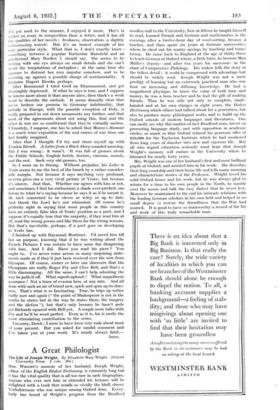A Great Philologist
The Life of Joseph Wright. By Elizabeth Mary Wright. (Oxford University Press. 2 vols. 30s.) Miss. WRIGHT'S memoir of her husband, Joseph Wright, editor, of the English Dialect Dictionary, is extremely long but it has the vital quality that is all too rare in such biographies. Anyone who ever met him or attended his lectures will be delighted with a book that recalls so vividly the bluff, cheery Yorkshireman who was unique among Oxford dons. Every- body has heard of Wright's progress from the Bradford woollen mill to the University, how at fifteen he taught himself to read, learned French and Gernian and mathematics in the evenings. after a twelve-hour day of wool-sorting, became a teacher, and then spent six years at German universities, where he eked out his scanty savings by teaching and trans- lating. He came back to England at the age of thirty-three to teach German at Oxford where, a little later, he became Max Miiller's deputy—and after ten years his successor—in the chair of Comparative Philology. His widow tells the story in the fullest detail ; it could be compressed with advantage but should be widely read. Joseph Wright was not a mere prodigy of learning but an extremely practical man who was bent on increasing and diffusing knowledge. He had a magnificent physique, he knew the value of both time and money, he was a born teacher and he had the gift of making friends. Thus he was able not only to complete, single- handed and at his own charges in eight years, the Dialect Dictionary which others had talked about for a generation, but also to produce many philological works and to build up the Oxford schools of modern languages and literatures. One can easily see why this matter-of-fact Bradford man, intent on promoting language study, met with opposition in academic circles, so much so that Oxford refused his generous offer of 210,000 for the Taylorian Institute which he had awakened from long years of slumber into new and vigorous life. But all who regard education seriously must hope that Joseph Wright's memory will endure in the University where he laboured for nearly forty years.
Mrs. Wright was one of her husband's first and most brilliant pupils at Oxford, and assisted him in his work. She describes their long courtship and their home life and tells many amusing and characteristic stories of the Professor. Wright loved his solid Oxford house and his work, but he was always glad to return for a time to his own people in the North, to ramble over the moors and talk the racy dialect that he never lost. Moreover he maintained to the end his intimate relations with the leading German scholars in his own field and helped in no small degree to restore the friendliness that the War had marred. It is good to have so trustworthy a record of the life and work of this truly remarkable man.


























 Previous page
Previous page